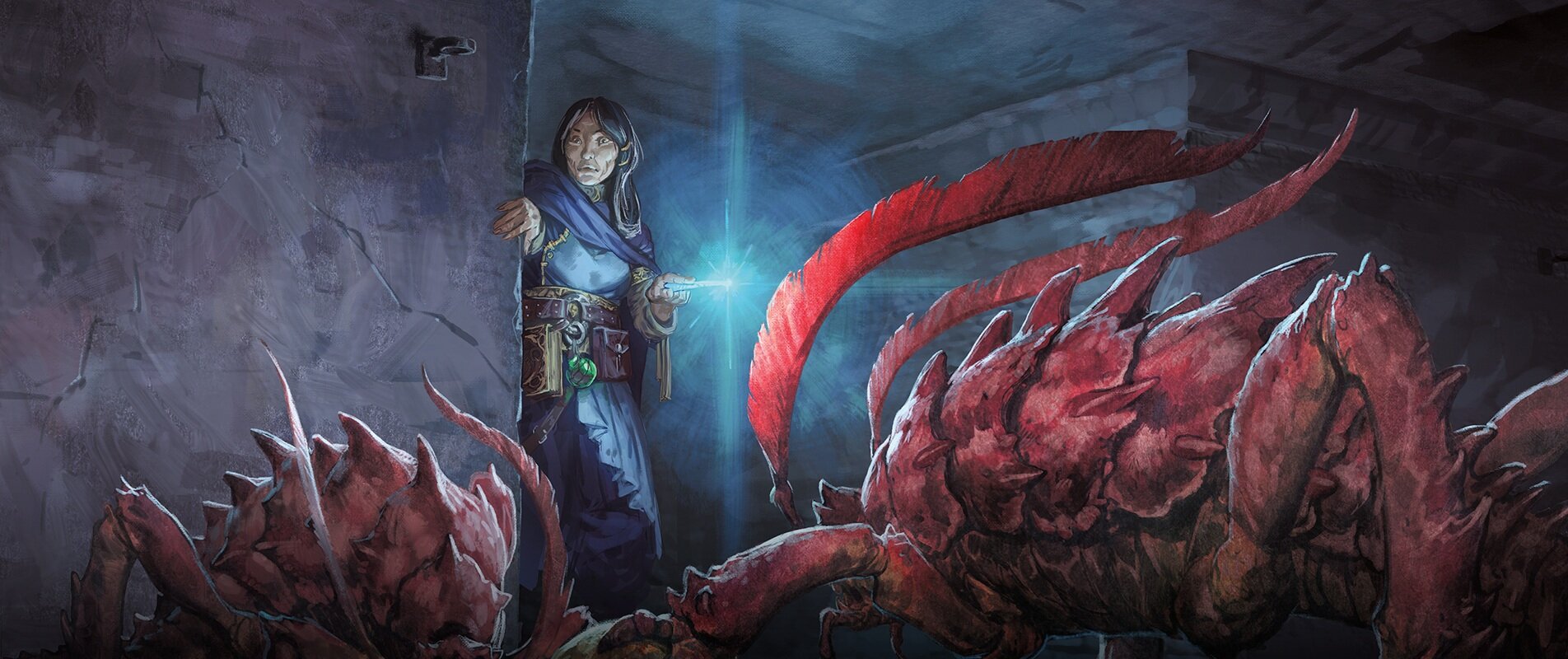Ever since the earliest days of D&D, characters have gained experience points (XP) for overcoming challenges. When they reach a specified XP total, they gain a level. Yet many 5e gamers are moving away from XP. According to a Twitter poll run by Sly Flourish in 2020, two-thirds of gamers use milestone levelling, and only a fifth use traditional XP.
Moreover, since 2016’s Curse of Strahd, milestone levelling seems to have emerged as the preferred option for the official published adventures. Milestone levelling was presented as an option in the very first 5e adventures, Hoard of the Dragon Queen and Rise of Tiamat, and was used more recently in Icewind Dale: Rime of the Frostmaiden and The Wild Beyond the Witchlight.
In this article, I look at the pros and cons of both milestone levelling and traditional XP in the hope to guide you as to which is right for your campaign. Tl;dr: they both have their place.
Experience Points

Since XP are the ‘traditional’ option, let’s consider them first.
Pro: XP pushes the players to be proactive. If you generally use milestone levelling and you try switching to XP, your players will start to realize that they need to do stuff if they want to be rewarded. If they clear out lots of chambers and kill lots of monsters, they level up faster! If they spend half an hour arguing about which passage to explore . . . they’re in for a slow grind. XP rewards player agency.
Pro: XP is spikey and unpredictable. Yes, I am listing this as a pro! Predictability can start to get boring. With XP, a big, climactic battle can sometimes return relatively little XP, and the reverse is true, too. A bit of swinginess is fun.
Pro: XP is objective. There’s very little DM interference with XP. Sure, a DM might award some ad hoc XP for good roleplaying or clever tactics, but generally speaking, the XP is decided by the totals in the Monster Manual.
Pro: XP is thrilling. It’s genuinely quite exciting to get to the end of the session and find out how much XP you got. It’s a nice ritual, and it’s always a bit of a surprise.
Con: XP means more record keeping. This is undeniable. Do you want to end every session adding up how many monsters the party killed? The maths only gets worse the higher up you go. ‘That’s 22,000 XP for each balor, 15,000 XP for each marilith . . .’
Con: XP can be too slow. A specific case in point: consider 1st level. Many DMs using milestone levelling will boost their players to 2nd level after a single session. The Dungeon Master’s Guide advises as much (see ‘Session-Based Advancement,’ p 261). Using normal XP rules, however, this is extremely unlikely to happen. A party of four would have to be defeat 24 goblins – eight ‘hard’ encounters’ – to reach 2nd level. That’s quite a slog to get through in one session. (Incidentally, however, levelling is by no means consistent under XP. The game slows down during Tier 2 – widely considered to be ‘the sweet spot’ of 5e – and speeds up again in Tier 4 as you beat your way to 20th level.)
Con: XP rewards combat too much. This is perhaps my biggest gripe with XP. Yes, in theory, you can award XP for noncombat challenges, but the game isn’t well set up to do this. The DMG only offers a couple of paragraphs on the subject (p 261).
Milestone levelling

Pro: milestone levelling is led by the story. As more and more DMs switch to a story-led, Critical Role–style game, XP starts to feel out of place. It’s perhaps for this reason, too, that the most story-led campaign modules are also the most likely to use milestone levelling.
Pro: milestone levelling means less book-keeping. This is perhaps the primary reason why more and more DMs are moving away from XP.
Pro: milestone levelling empowers the DM. If XP is more objective, milestone levelling is more subjective: ‘when to level up’ is entirely a matter for the DM. It becomes a dial the DM can play with to create ‘beats’ over the long-term.
Con: milestone levelling removes player agency. The downside to the point above, really. XP rewards players who make things happen: players who kick down the door and slay monsters. There isn’t much of an incentive for this in a game with milestone levelling, and as a result, inertia and overthinking go unpunished.
Con: milestone levelling can be too fast (or too slow). A case in point: in Curse of Strahd, characters gain a level as a reward for completing certain tasks in the story, many of which are randomly determined. As a result, it is entirely possible for groups to level up very quickly or very slowly. This isn’t necessarily ‘wrong’, but it can be frustrating or anticlimactic.
What do you want to reward?
Ultimately, the best system for you is the one that fits the play style you want to pursue. XP and milestone levelling both have their strengths, and both have their drawbacks. For a traditional dungeon crawler campaign where story takes a back seat, or a hexcrawl campaign where player agency is everything, I would recommend XP. For a game with an overarching story and combat is less frequent, I would suggest milestones.
If you like what I do, please subscribe by clicking here. You can unsubscribe any time. You can find me on Facebook at scrollforinitiative, Twitter @scrollforinit, and Instagram @scrollforinitiative. And if you want to make my day, you can support me on Patreon or buy me a coffee here.
